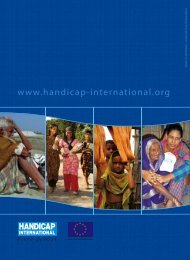Full page photo print - Harvard Law School Project on Disability
Full page photo print - Harvard Law School Project on Disability
Full page photo print - Harvard Law School Project on Disability
You also want an ePaper? Increase the reach of your titles
YUMPU automatically turns print PDFs into web optimized ePapers that Google loves.
the ICCPR, has stated in general Comment 6 that “States have the supreme duty to prevent<br />
wars, acts of genocide and other acts of mass violence causing arbitrary loss of life.” 5 The<br />
State’s obligati<strong>on</strong>s include making every effort to avert the danger of war and to strengthen<br />
internati<strong>on</strong>al peace and security. These obligati<strong>on</strong>s c<strong>on</strong>stitute the most important c<strong>on</strong>diti<strong>on</strong><br />
for the safeguarding of the right to life. States may not limit the right to life during times of<br />
war or emergency and are required to provide protecti<strong>on</strong> and safety to pers<strong>on</strong>s who are n<strong>on</strong>combatants<br />
as a matter of internati<strong>on</strong>al humanitarian law.<br />
States must also refrain from acti<strong>on</strong> that may intenti<strong>on</strong>ally take away life. The human rights<br />
Committee has c<strong>on</strong>demned the practice of infanticide for infants with disabilities and noted that<br />
it “is gravely c<strong>on</strong>cerned at reports that new-born handicapped infants have had their lives ended<br />
by medical pers<strong>on</strong>nel.” 6 The Committee <strong>on</strong> the rights of the Child urged States to “review<br />
and amend laws affecting disabled children which are not compatible with …the C<strong>on</strong>venti<strong>on</strong>,<br />
for example legislati<strong>on</strong> which denies disabled children an equal right to life, survival and<br />
development (including, in those countries which allow aborti<strong>on</strong>, discriminatory laws <strong>on</strong> aborti<strong>on</strong><br />
affecting disabled children, and discriminatory access to health services…).” 7<br />
The Human Rights Committee has stressed that the protecti<strong>on</strong> of the right to life requires<br />
that States adopt positive measures designed to protect life. These may include measures<br />
to increase life expectancy, decrease infant and child mortality, combat disease, and provide<br />
rehabilitati<strong>on</strong>, adequate food, clean water shelter, and other basic survival needs.<br />
Rule 2.3 of the un standard rules requires that “States should ensure that pers<strong>on</strong>s with<br />
disabilities, particularly infants and children, are provided with the same level of medical care<br />
within the same system as other members of society.” 8<br />
The CRPD reflects these c<strong>on</strong>cerns about the right to life of people with disabilities. In Article<br />
10, the CRPD recognizes the inherent right to life for people with disabilities and, in additi<strong>on</strong>,<br />
requires States to “take all necessary measures” to ensure the enjoyment of that right by<br />
people with disabilities, <strong>on</strong> an equal basis with others. Article 11 of the CRPD requires<br />
positive measures of protecti<strong>on</strong> and safety for people with disabilities affected by situati<strong>on</strong>s<br />
of humanitarian emergencies and risk. Article 11 is closely c<strong>on</strong>nected to Article 10 insofar as<br />
war and other acts of mass violence c<strong>on</strong>tinue to take the lives of thousands of innocent human<br />
beings every year.<br />
In sum, States have the obligati<strong>on</strong> to respect, protect, and fulfill the right to life of people<br />
with disabilities and their right to protecti<strong>on</strong> and safety in situati<strong>on</strong>s of risk and humanitarian<br />
emergency. In meeting their obligati<strong>on</strong> to respect the right to life of people with disabilities,<br />
States must refrain from directly or indirectly infringing <strong>on</strong> disabled peoples’ enjoyment of the<br />
right to life. States must also refrain from policies that enforce discriminatory practices that may<br />
impact their right to life, including in times of humanitarian emergency.<br />
The obligati<strong>on</strong> to protect includes, am<strong>on</strong>g other things, the adopti<strong>on</strong> of all appropriate legislative,<br />
administrative, and other measures to prevent threats to the life of people with disabilities by<br />
state officials, as well as third parties. Protective measures could include careful m<strong>on</strong>itoring of<br />
all settings where people with disabilities live or receive services, whether publicly or privately<br />
operated. Transiti<strong>on</strong>ing people with disabilities into community-living situati<strong>on</strong>s with appropriate<br />
5 See http://www.umn.edu/humanrts/gencomm/hrcom6.htm<br />
6 C<strong>on</strong>cluding Observati<strong>on</strong>s of the Human Rights Committee for The Netherlands. UN Doc. CCPR/CO/72/<br />
NET (2001). http://www1.umn.edu/humanrts/hrcommittee/netherlands2001.html<br />
7 See http://www.unhchr.ch/html/menu2/6/crc/doc/days/disabled/pdf<br />
8 See http://www.ohchr.org/english.law/opportunities.htm<br />
74 human rights. yes! aCtiOn and adVOCaCy On the rights Of persOns with disabilities




